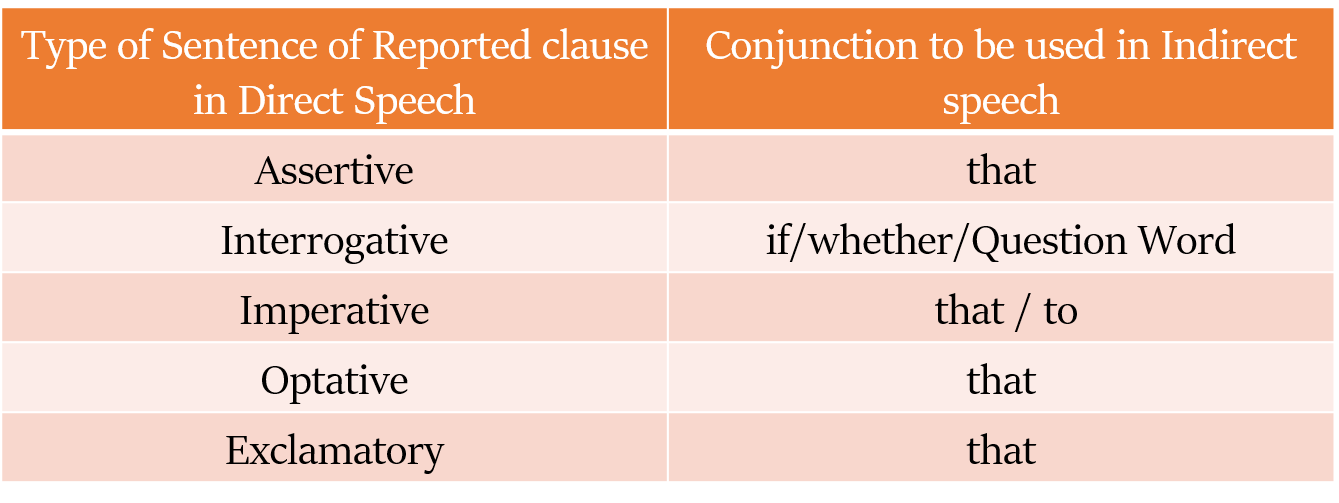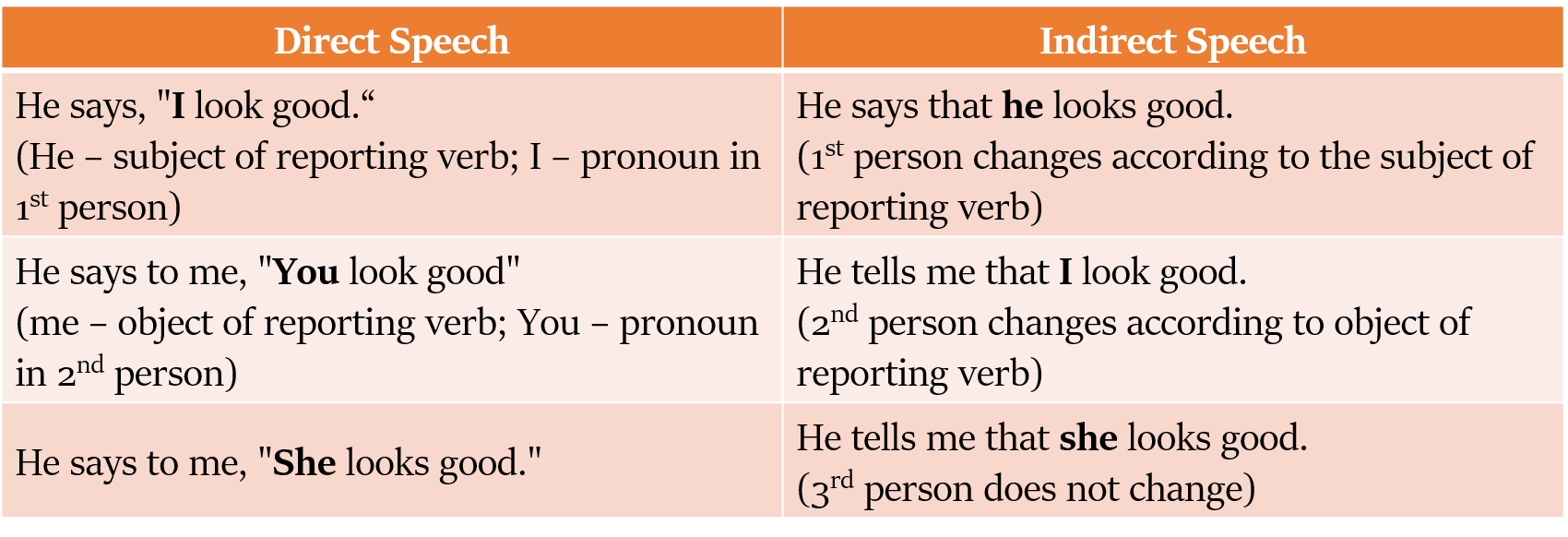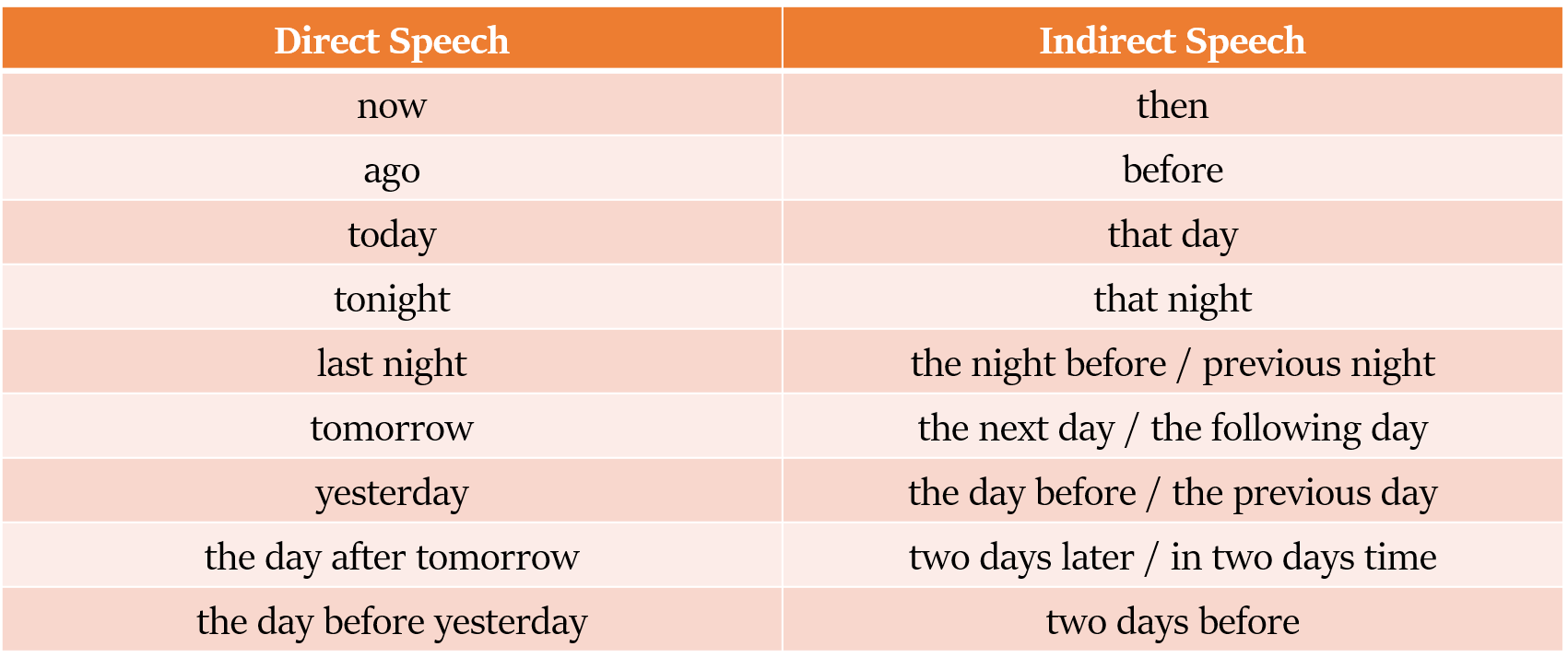Rules for changing Direct Speech into Indirect
To keep the meaning intact, we make some major changes while changing from direct speech to indirect speech.
Let’s see them!
Conversion from direct speech to indirect speech
We consider the following points for conversion:
- insertion of conjunction
- change of person
- change of tense
- change in the reporting verb
- change in the expression of time or place
- removal of unnecessary things like hello, wow, etc (i.e. those expressions which we generally only use when talking to someone face to face, i.e. in spoken English)
We will study some of the above points in this article. But some of the above require a separate article, e.g. change in tenses, change in the reporting verb. We will cover them in subsequent articles.
Insertion of Conjunction
While changing a sentence into indirect speech, ‘comma’ and ‘inverted commas’ are removed and instead some conjunction (e.g. ‘that’) is used.
The conjunction in indirect speech combines reporting clause with reported speech.
The conjunction we will use in indirect speech will depend on the kind of sentence in the reported clause of direct speech.

Change in Person/Pronoun
When we change direct speech into indirect speech, we change the pronouns, where necessary.

Pronouns are changed according to the following rules:
You can remember it using the acronym: S (
- S - Subject of reporting verb
- O - Object of reporting verb
- N - No change

Change in Time and Place
If Reporting verb is in present tense – Then no change is made in the words relating to time & place
If Reporting verb is in past tense – Then the words relating to time and place are changed.
Words expressing nearness in time or place are generally changed into words expressing distance.



Change of Modals
There’s no change in the following modals:
should, would, could, might, ought to, used to
‘I could meet you at the bar.’
He said that he could meet us at the bar.
‘We might go fishing if we have spare time.’
They said they might go fishing if they have spare time.
While changing Direct Speech into Indirect Speech, we make the following changes:
may, can
- may – might
- can – could
She said, “I cannot help you at this time.“
She said that she couldn’t help me at that time.
will
will (with second and third person) → would/should
‘would’ can come with first, second or third person.
‘should’ is preferred only with first person.
Exceptions
So, we know that ‘will’ usually changes to ‘would’, ‘can’ to ‘could’, and ‘may’ to ‘might’. However, there are a few exceptions:
Exception 1
If verb in the reporting clause is in a present tense and the situation we are reporting still exists or is still in the future → We prefer will, can, and may in the indirect speech.
‘Careful! You will burn your hands!’
I warned him he would burn his hands. (the situation no longer exists, so we used ‘would’)
‘I will be in Mewad at Deepawali.’
He tells me he will be in Mewad at Deepawali. (tells – present tense; the situation still exists or is in the future, so we used ‘will’)
Exception 2
If verb in the reporting clause is in a past tense and the situation we are reporting still exists or is still in the future → We can use either would or will, can or could, and may or might in the indirect speech.
‘The situation can be resolved.’
They said the situation can/could be resolved. (said – past tense)
shall
shall (comes with I/we) → would/should
‘would’ can come with first, second or third person.
‘should’ is preferred only with first person.
He said to me, “I shall come to meet you tomorrow.”
He told me that he would come to meet me the next day.
‘should’ comes with all persons if it is a request.
must
Concept 1
If in direct speech, ‘must’ has been used to say that it is necessary to do something → We can use either ‘must’ or ‘had to’ in the indirect speech (‘had to’ is preferred)
‘You must be home by 8 o’clock.’
He said I must / had to be home by 8 o’clock.
Concept 2
If in direct speech, ‘must’ has been used to conclude that something (has) happened or say that something is true (i.e. when we draw conclusions) → We use ‘must’ (rather than ‘had to’) in the indirect speech
‘I must be getting old.’
He said that he must be getting old.
mustn’t
If in direct speech, mustn’t has been used → We use ‘mustn’t’ in the indirect speech (rather than didn’t have to)
‘You mustn’t kill John Connor.’
He warned me that I mustn’t kill John Connor.
We sometimes use a modal verb in indirect speech, even though there was no modal verb in the direct speech.
‘You’re not allowed to play here.’
He told me that I mustn’t play there.
Conversion of Indirect into Direct
The conversion of indirect speech into direct speech is pretty easy and generally presents no special difficulties.
Indirect speech: As the salesman entered the society, he was met by a watchman, who asked him if he was a delivery boy.
Direct speech: As the salesman entered the society, he was met by a watchman, who asked, “Are you a delivery boy?”
Indirect speech: He asked how he could be of any help.
Direct speech: He said, “How can I be of any help?

Extra Books and Tools
If you prefer to learn via books, or want some good English Grammar books for reference purposes, you may read this article which enlists some of the books recommended by us.